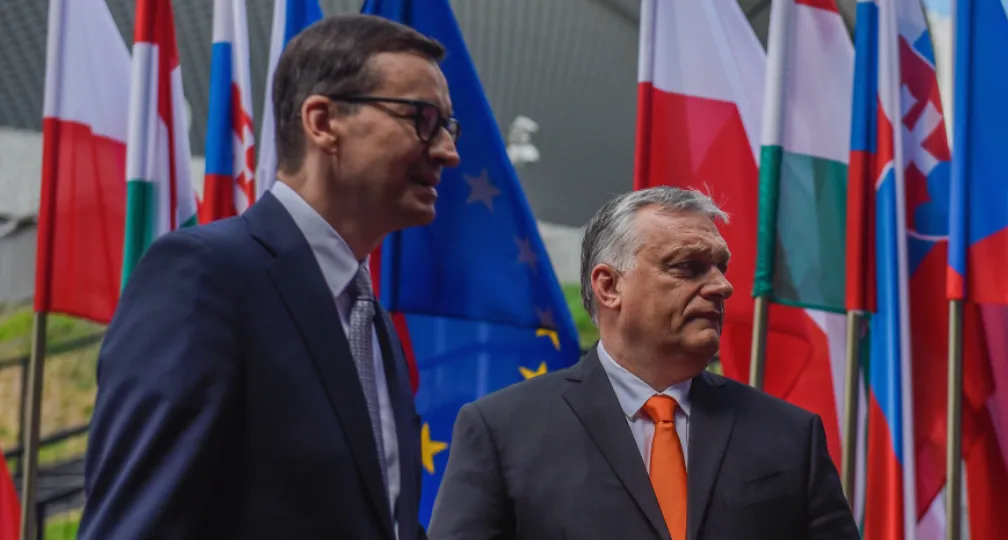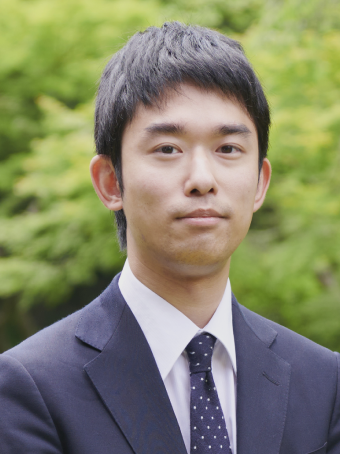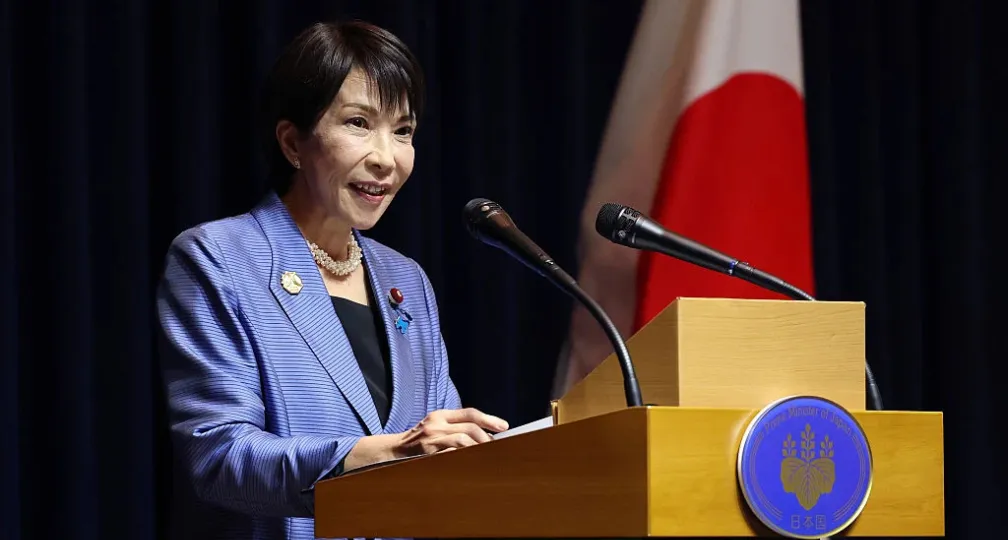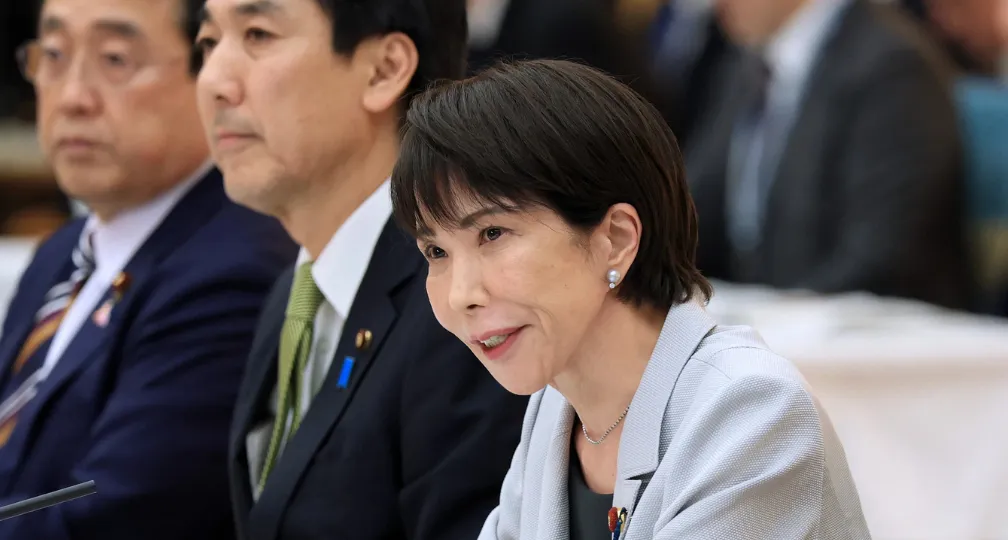As war in Ukraine continues, Poland and Hungary threaten EU stability

But there is also another factor: EU countries are not on the same page as to the level of commitment they have to protect democracy.
Immediately after Russia invaded Ukraine, EU countries condemned Moscow’s act of aggression and were quick to agree on a series of measures, from the economic sanctions imposed in February to a fifth package of restrictive measures including an import ban on Russian coal.
Nevertheless, such unity is starting to collapse as some countries begin to put their own interests first. A typical example is Hungary, which has been expressing opposition to an EU embargo on Russian oil imports.
It took over a month to negotiate on the sixth sanctions package before finally agreeing in June to exempt pipeline oil from the oil embargo as a concession to Hungary.
Can we really say that EU member countries, hugely affected by the war in Ukraine, share the same values and are acting together?
This article focuses primarily on Hungary, which refused to support the sixth sanctions package, and Poland, whose democracy is declining along with Hungary, to highlight the conflicts of values within the EU.
At the same time, it is important to examine the implications of the war in Ukraine for EU countries and the European Parliament, and what Japan’s diplomacy toward the EU should look like.
Conflict over values
One of the major factors behind the disarray among EU member states over their response to Russia is said to be their concerns over the effects of sanctions on their own economies.
But such discord is caused not only by economic factors.
There has long been a deep-rooted discrepancy among member states regarding values, including democracy and the rule of law, and the conflict remains even today.
As an example, we can take the notorious “illiberal democracy” speech made by Hungarian Prime Minister Viktor Orban in 2014, in which he said, “Democracy is not necessarily liberal.”
In fact, the Hungarian government has, in recent years, been increasingly stigmatizing critics of the government. A case in point is the Hungarian parliamentary election held in April. During the election, opposition parties were given very little time on state television.
Orban’s political force is also pushing ahead with strengthening the grip on influential independent media. Hungarian elections are free but not fair.
Furthermore, despite the allegations of corruption in the country, especially misuse of EU funds and conflicts of interest, the prosecution rate in Hungary remains low compared with other EU countries, which indicates that Orban and his allies are using public funds for their own interests.
In Poland, the rule of law and judicial independence are being threatened, as the government has repeatedly attempted to intervene through such measures as lowering the retirement age for judges, apparently in a bid to appoint loyalists instead, and putting judges under disciplinary investigations on the basis of their judgments.
Democratic backsliding
Democracy and the rule of law are laid down as fundamental values in Article 2 of the Treaty on European Union (TEU).
To become a member of the EU, an applicant country must meet conditions known as the Copenhagen criteria, which include a stable democracy and the rule of law. Poland and Hungary took measures to comply with the criteria.
But since the criteria cannot be used to make countries respect the values after joining the institution, the EU is urging the two countries to make improvements by moving to withhold funds based on Article 7 of the TEU, a mechanism designed to deter member states from advancing policies that threaten democratic institutions.
Despite such moves, the two countries are continuing to challenge the basic values of the EU.
When they joined the EU, Poland and Hungary were hoping that by becoming members they could enjoy the same level of wealth as Western European countries and Central European countries like Austria.
But such hopes turned into disappointment as they faced the realities of fierce market competition and economic disparity within the rest of EU.
The disappointment led to resistance within the conservative camps of Poland and Hungary toward efforts to introduce democracy and the rule of law, which the countries had been pushing for following the end of the Cold War.
Moreover, their discontent over the EU and major countries such as Germany grew as they believed the EU was politically suppressing them and hampering autonomous decision-making.
Backed by such resistance and discontent, the Orban administration in Hungary and Mateusz Morawiecki’s administration in Poland have been pushing ahead with the politics of putting their own country first and at the same time trying to dilute democracy and the rule of law from “thick” principles, which include factors such as a consideration for human rights, to “thin” principles that are limited to procedural matters.
Resisting ‘imperialism’
Poland and Hungary are taking a confrontational attitude toward the EU, but this doesn’t mean they are showing a supportive stance toward Russia. Things are not as simple as that.
Even before Russia started invading Ukraine, Poland had been warning that Russia under President Vladimir Putin could be a threat to Europe.
In Hungary, Orban and right-wing intellectuals had repeatedly been saying the country would resist “imperialism” by major powers.
It is often pointed out that what they mean by major powers are Western countries such as some EU members and the United States, but such resistance against Western superpowers is deeply connected with the history of suppression by the Soviet Union, which means Hungary also has a sense of being victimized by Russia.
Both Poland and Hungary have not forgotten what life was like as neighbors of the Soviet Union.
Nevertheless, the self-recognition that they were the victims of Soviet aggression does not necessarily make them unite in terms of diplomacy toward Russia.
Rather, Orban and Morawiecki have been criticizing each other regarding their response to the war in Ukraine, resulting in a split in the two countries’ ties.
While Warsaw has been clear on its policy to stand against Russia, Budapest has maintained an ambiguous position on the war, although it condemned Moscow’s military attack.
Hungary has also shown opposition from the beginning to Poland’s support of Ukraine, notably its offering of military supplies and training.
Poland sees Russia as a threat to national security more seriously than Hungary does, as it has a longer history of being trampled on by the country, first through territorial partitions in the late 18th century conducted by Russia, Prussia and Austria, then with the division of its territory again between Nazi Germany and the Soviet Union during World War II.
Ivan Kratsev, chairman of the Center for Liberal Strategies in Sofia, Bulgaria, has highlighted the increasing division between Hungary and Poland.
“Each of these crises divided the EU: the global financial crisis exhibited a classical North/South divide whereas the migration one caused an East/West fracture. Now paradoxically, with the Russian war, the divide occurred within the Eastern part of Europe,” he said in an interview with Paris-based think tank Institut Montaigne.
Balancing interests
What we can learn from such circumstances is that Hungary and Poland are conducting diplomacy based on their individual logic, without being influenced by the power balance between different systems.
Although democracy is in decline within the two countries and they are both in conflict with the EU, that doesn’t necessarily mean their bilateral relationship or their relations with Russia have deepened.
The EU — the world’s largest single market including Germany — are indispensable for Hungary and Poland to maintain balance and avoid depending excessively on Russia or other superpowers. It is unrealistic for them to withdraw from the EU framework.
From the EU perspective, the two countries have issues regarding common values but hold an important position in strengthening the EU’s presence as a political framework to fight against Russia.
The key lies in how the European Commission and other EU members can deepen economic and political ties with Hungary and Poland in the long term through building a relationship — in political theorist Chantal Mouffe’s words, one that is not antagonistic but agonistic — by continuing dialogue while taking into account their domestic situations and the geoeconomic and geopolitical environment.
Japan’s EU policy
As for Japan, it is important to be aware of the characteristic that the EU comprises various aspects — not only a political framework fighting against Russia but also a community of values and economies — and that there are fluctuations within the EU because of some member states that act without considering the competition among superpowers.
From which perspectives should Tokyo approach each of the countries within the EU?
Japan must conduct segmentalized diplomacy for each country by analyzing them multidimensionally, including multiple layers — according to different systems and countries in addition to the EU framework — and taking into consideration such factors as democracy, international economics and geopolitics.
(Photo Credit: Omar Marques / Getty Images)

Geoeconomic Briefing
Geoeconomic Briefing is a series featuring researchers at the IOG focused on Japan’s challenges in that field. It also provides analyses of the state of the world and trade risks, as well as technological and industrial structures (Editor-in-chief: Dr. Kazuto Suzuki, Director, Institute of Geoeconomics (IOG); Professor, The University of Tokyo).
Disclaimer: The opinions expressed in Geoeconomic Briefing do not necessarily reflect those of the International House of Japan, Asia Pacific Initiative (API), the Institute of Geoeconomics (IOG) or any other organizations to which the author belongs.


Research Fellow,
Digital Communications Officer
Yusuke Ishikawa is Research Fellow and Digital Communications Officer at Asia Pacific Initiative (API) and Institute of Geoeconomics (IOG). His research focuses on European comparative politics, democratic backsliding, and anti-corruption. He also serves as External Contributor for Transparency International’s Anti-Corruption Helpdesk, as Associate Research Fellow at the EUROPEUM Institute for European Policy, and as Part-time Lecturer in European Affairs at the Department of Economics and Business Management, Saitama Gakuen University. Prior to his current roles, Research Associate at IOG and API, contributing to its translation project of Critical Review of the Abe Administration into English and Chinese. Previously, he has worked as Research Assistant for API's CPTPP program and interned with its Fukushima Nuclear Accident and Abe Administration projects. His other experience includes serving as a visiting research fellow at EUEOPEUM Institute, a full-time research intern at Transparency International Hungary, and as a part-time consultant with Transparency International Defence & Security in the UK. His publications include "NGOs, Advocacy, and Anti-Corruption" (In Routledge Handbook of Anti-Corruption Research and Practice, 2025) and A Dangerous Confluence: The Intertwined Crises of Disinformation and Democracies (Institute of Geoeconomics, 2024). He has been featured in national and international media outlets including Japan Times, NHK, TV Asahi, Neue Zürcher Zeitung (NZZ), Handelsblatt, Expresso, and E-International Relations (E-IR). He received his BA in Political Science from Meiji University, MA in Corruption and Governance (with Distinction) from the University of Sussex, and another MA in Political Science from Central European University. During his BA and MAs, he also acquired teacher’s licenses in social studies in secondary education and a TESOL (Teaching English to Speakers of Other Language) certificate. [Concurrent Positions] Associate Research Fellow, EUROPEUM Institute for European Policy, Czechia External Contributor Consultant, Anti-Corruption Helpdesk, Transparency International Secretariat (TI-S), Germany Part-time Lecturer, Department of Economics and Business Management, Saitama Gakuen University, Japan
View Profile-
 Trump, Takaichi and Japan’s Strategic Crossroads2026.02.03
Trump, Takaichi and Japan’s Strategic Crossroads2026.02.03 -
 Analysis: When Is a Tariff Threat Not a Tariff Threat?2026.01.29
Analysis: When Is a Tariff Threat Not a Tariff Threat?2026.01.29 -
 Takaichi’s Strengths and the Need for ‘Strategic Signaling’2026.01.23
Takaichi’s Strengths and the Need for ‘Strategic Signaling’2026.01.23 -
 Takaichi’s Twin Challenges: Economic Growth and Security2026.01.13
Takaichi’s Twin Challenges: Economic Growth and Security2026.01.13 -
 It’s Now or Never: India’s Ambitious Reform Push2026.01.09
It’s Now or Never: India’s Ambitious Reform Push2026.01.09
 Oil, Debt, and Dollars: The Geoeconomics of Venezuela2026.01.07
Oil, Debt, and Dollars: The Geoeconomics of Venezuela2026.01.07 It’s Now or Never: India’s Ambitious Reform Push2026.01.09
It’s Now or Never: India’s Ambitious Reform Push2026.01.09 The “Economic Security is National Security” Strategy2025.12.09
The “Economic Security is National Security” Strategy2025.12.09 Analysis: When Is a Tariff Threat Not a Tariff Threat?2026.01.29
Analysis: When Is a Tariff Threat Not a Tariff Threat?2026.01.29 Navigating Uncertainty in U.S. Space Policy: Decoding Elon Musk’s Influence2025.04.09
Navigating Uncertainty in U.S. Space Policy: Decoding Elon Musk’s Influence2025.04.09













